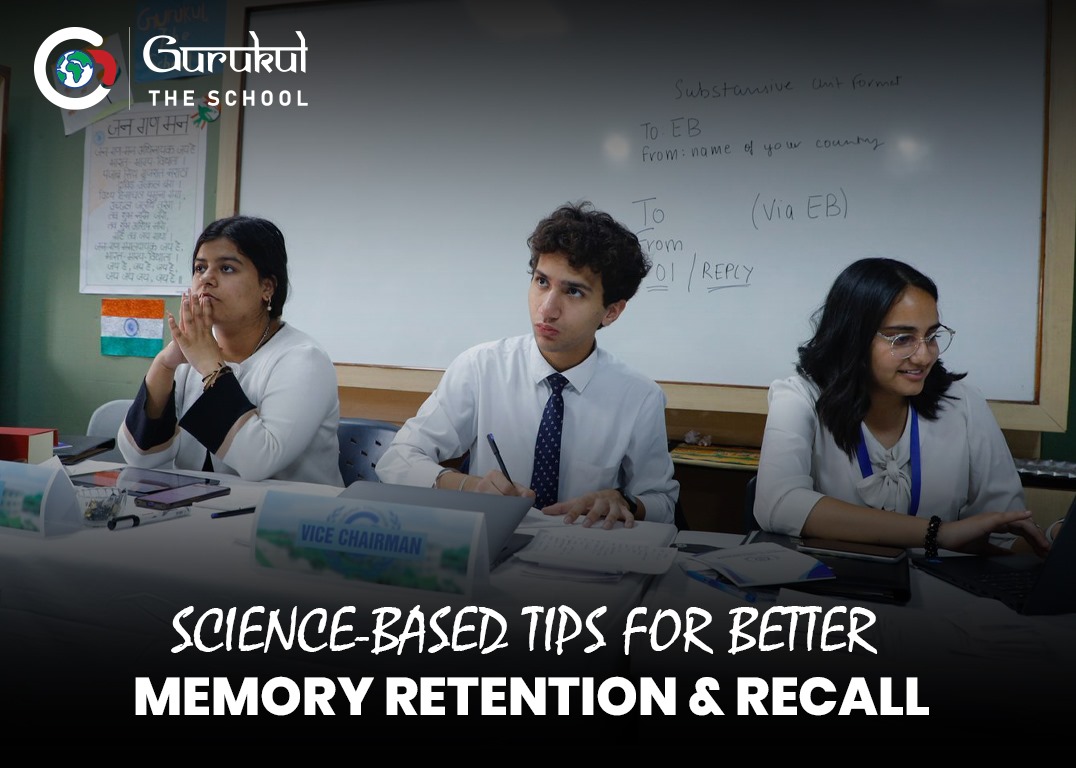Science-Based Tips for Better Memory Retention & Recall
posted on Feb 07, 2024
Visualization techniques involve creating vivid mental images to encode and retrieve information more effectively. As Albert Einstein famously said, "Imagination is more important than knowledge

Science plays a pivotal role in decoding the mechanisms behind memory retention and recall. Moreover, science digs deeper into cognitive processes that help shape an individual’s ability to learn and retain. Through extensive research, scientists have identified various techniques and strategies that contribute to enhanced memory function. These include the likes of spaced repetition, mnemonic devices, and multisensory learning.
The aforementioned methods leverage the brain's neuroplasticity to strengthen synaptic connections and improve information retention over time. Implementing these science-backed tips has contributed tremendously to the intellectual upliftment of students from Gurukul The School. This is reflected in improved academic performance, higher information retention rates, and appreciable recall accuracy among our students, which has also helped us earn the position of one of the top 10 CBSE schools in Ghaziabad time and again. So today, through this blog post, we would like to share with you all some of such science-backed tips for better memory retention and recall, which will help take your learning potential to an all-new level.
Chunking is an interesting cognitive strategy that involves breaking down large pieces of information into smaller, more manageable units. This method is pivotal in memory retention and recall as it helps convert complex data into smaller, meaningful patterns.
Look at it this way - when you try to learn a new phone number, doesn’t chunking it into three parts, i.e., area code, prefix, and line number, become helpful in faster memorization instead of remembering it as a string of ten digits? It works the same way for kids, too! Benefits of chunking include improved memory retention, faster learning, reduced cognitive load, enhanced comprehension, and increased efficiency in problem-solving. This is why we at Gurukul The School emphasize on chunking for memory retention and recall.
Spaced repetition is a learning technique that involves spacing out study sessions over intervals, which can help strengthen long-term memory retention by underlining memory recall at optimal intervals.
Research has proved the efficacy of this method in significantly improving learning outcomes. For instance, a study by Bahrick and Hall (2005) found that students who utilized spaced repetition techniques retained information for much longer periods compared to those who relied solely on traditional practices. By spacing out learning sessions, students can better encode information into their long-term memory, leading to more effective recall and mastery of subjects over time.
Visualization techniques involve creating vivid mental images to encode and retrieve information more effectively. As Albert Einstein famously said, "Imagination is more important than knowledge. For knowledge is limited, whereas imagination embraces the entire world, stimulating progress, giving birth to evolution."
By engaging the imagination, learners can enhance memory retention and recall by associating information with memorable visual cues. At Gurukul The School, we celebrate this approach because it allows our students to visualize abstract concepts, making them more believable and easier to understand. Through visualization, learners create a rich mental landscape that aids in the storage and retrieval of information.
Dual coding involves combining verbal and visual representations of information, thereby strengthening memory recall and engaging multiple brain regions. By associating words with corresponding images or diagrams, learners create richer cognitive connections, enhancing encoding and retention.
This method draws value from the brain's capacity to process and store information through both linguistic and visual pathways. It is believed that dual coding can help to significantly improve learning outcomes, enhancing recall and comprehension compared to single-modality approaches.
By leveraging both verbal and visual modalities, dual coding provides learners with diverse cognitive pathways for accessing and retaining information, encouraging deeper understanding and retention of concepts. This further adds up to make dual coding a trusted technique of memory retention and recall.
Last but not least comes Active Learning, a science-backed memory retention and recall technique, which involves participatory engagement in hands-on activities and discussions. This plays a vital role in stimulating multiple senses to make information more memorable.
For example, in a science class, students get to understand chemical reactions better only when they actively conduct experiments in the science lab rather than passively listening to theory-based lectures. This interactive approach encourages exploration, critical thinking, and problem-solving skills among children.
It is believed active learning can help in improving knowledge retention and subject understanding, compared to traditional learning methods. By actively engaging with the material, students develop a deeper comprehension of concepts, leading to a lasting mastery of subjects. Active learning transforms classrooms into dynamic explorative environments where students take the driver’s seat in their learning journey.
Conclusion
If research numbers are to be believed, we humans tend to forget 50% of the information presented to us in an hour and 70% in 24 hours. To get over this limitation, we at Gurukul The School, one of the top five school in ghaziabad, suggest investing time and effort in science-backed mechanisms of memory retention and recall.
We can confidently state that putting the above methodologies into play shall without a doubt lead to improved learning outcomes and academic performance in children. However, you must make sure to remain consistent with your efforts and give these techniques the necessary amount of time to get the desired results.